MAESTRO (2023)
While Leonard Bernstein becomes a classical-music superstar, his private life is sometimes troubled

While Leonard Bernstein becomes a classical-music superstar, his private life is sometimes troubled


After Bradley Cooper’s directorial debut, A Star is Born (2018), snagged the No.2 spot on my annual best-of-the-year list (beaten by Paul Thomas Anderson’s Phantom Thread), I was thrilled to hear he’d be tackling a biopic of composer Leonard Bernstein—Steven Spielberg’s West Side Story (2021) had topped my 2021 list.
Spielberg himself, who ultimately became a co-producer, was once considered a potential director for Maestro. Yet, it might be fortuitous that ended up in the hands of Cooper instead. For while his second movie is, as I also wrote of A Star is Born, “big, passionate, and just on the right side of melodrama”, he nevertheless delivers something a little more elliptical, and surely less sentimental, than Spielberg would have. Cooper’s Maestro makes its mission clear by quoting Bernstein’s assertion that “a work of art does not answer questions, it provokes them, and its essential meaning lies in the tension between the contradictory answers.”
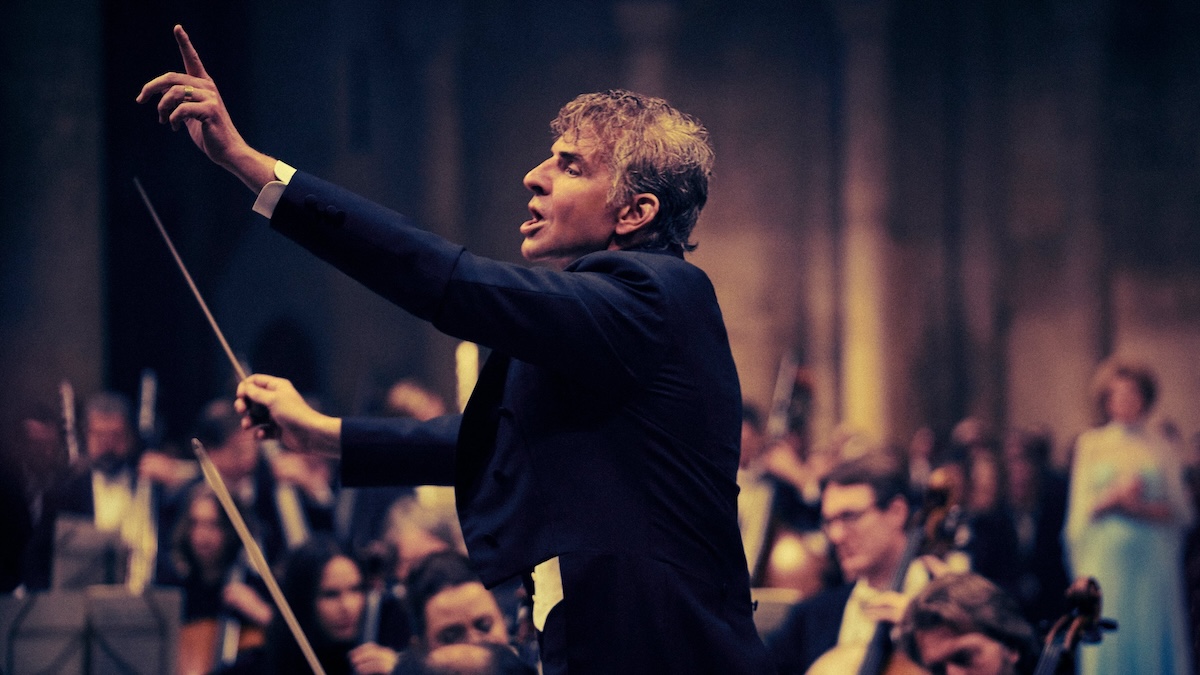
Like last year’s other big classical-music movie, Todd Field’s Tár (which Maestro is exceedingly unlike in many other ways), Maestro opens with an interview. We see an elderly Bernstein (Cooper) seated at his piano, playing the postlude to Act 1 of his late opera A Quiet Place, and slowly realize that he’s being documented by a small crew. He speaks of “her” ghost, though we don’t yet know who “she” is.
The film now switches to black-and-white and hurtles back decades, to the mid-1940s. A much younger Bernstein is seen briefly with his boyfriend, David Oppenheim (Matt Bomer), before a famous phone call arrives, asking him to step in and conduct the New York Philharmonic at short notice.
The film’s elegiac opening has given way to a much more exuberant mood. This shift is captured musically too, by the inclusion of the Symphonic Suite from On the Waterfront on the soundtrack. While Cooper’s movie remains faithful to the essential facts, it isn’t enslaved by the details. (Although the Suite dates from 1954, a decade after Bernstein’s 1943 Carnegie Hall debut—the occasion that truly launched his career—this artistic choice underscores the film’s themes of perseverance and triumph.)
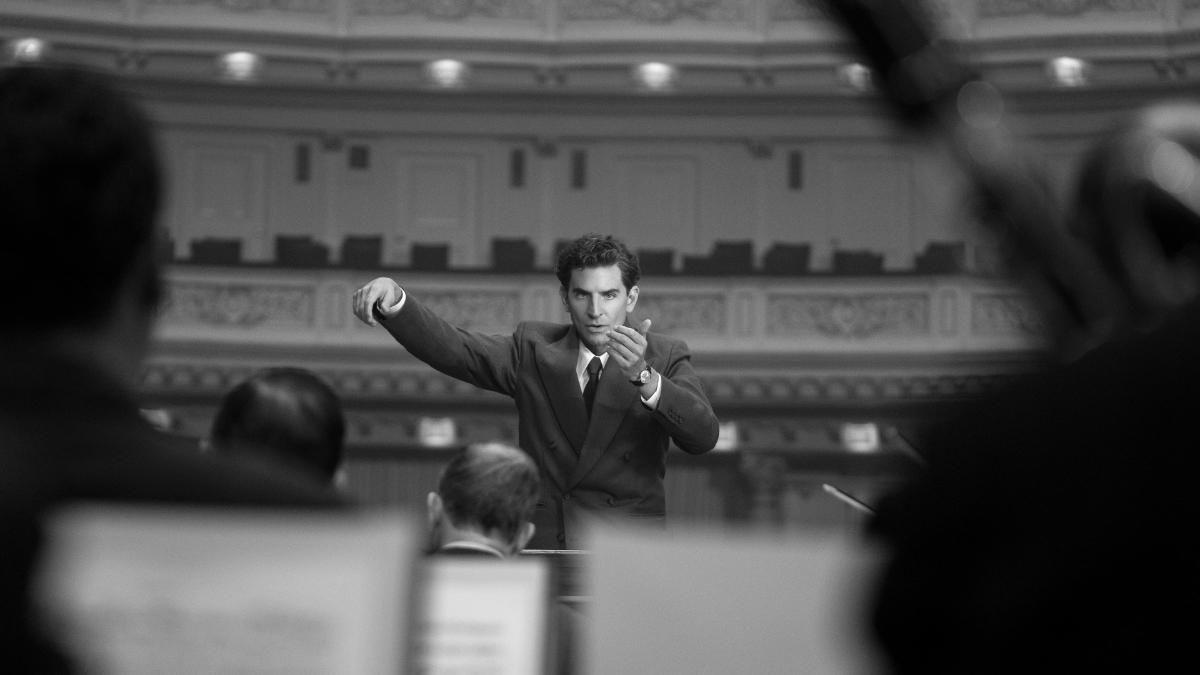
Before long, Bernstein also meets and falls in love with the young actress Felicia Montealegre (Carey Mulligan). The rest of the movie then juxtaposes snapshots of their lives, both together and separately, returning to colour roughly one-third of the film’s duration.
Leonard Bernstein became the most celebrated American classical musician of his time, both as a composer and conductor. Felicia Montealegre’s career, however, takes a quieter path. In their private lives, they find greater equality. They have children; Bernstein continues to have male lovers, notably Tommy Cothran (Gideon Glick). Felicia’s health declines, and perhaps Bernstein’s immense self-confidence does too. The Bernsteins host lavish parties for the elite and the intelligentsia, and indeed some of the film’s most telling moments come during these social events. Maestro‘s focus, however, remains firmly on the central couple, making all other characters peripheral.
There is terrific chemistry between Bernstein and Felicia from the beginning, making the later partial souring of that chemistry all the more obvious, and both actors dazzle in very different ways.
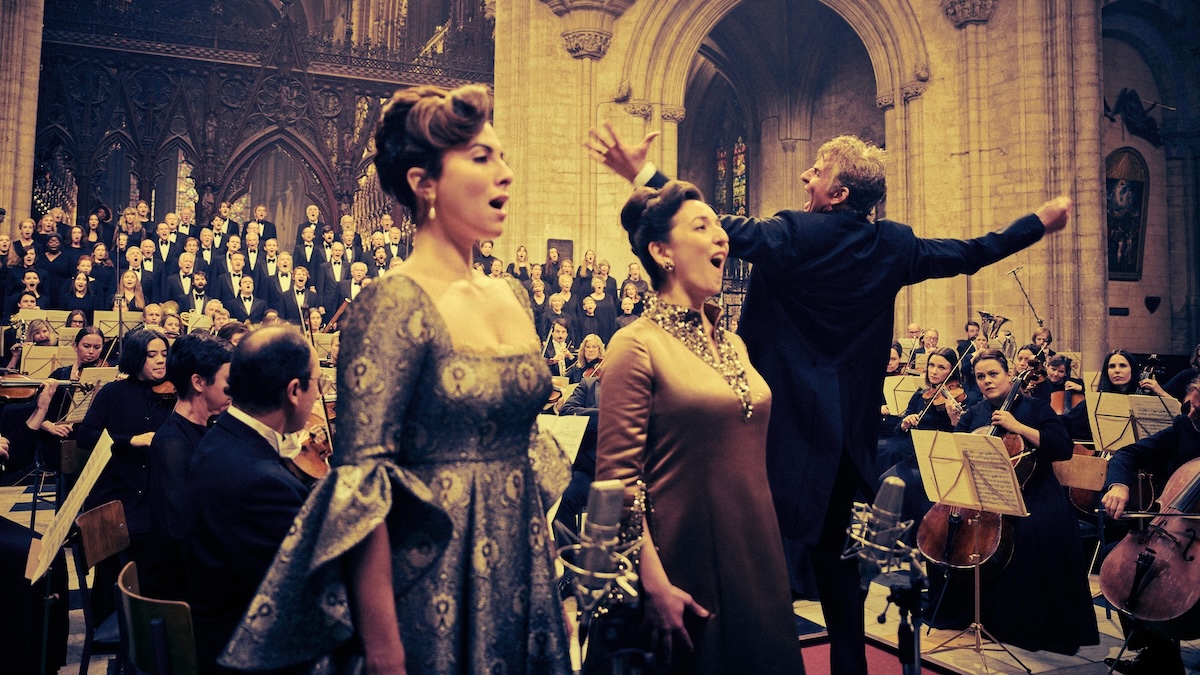
Sporting a prosthetic nose and a delivery tinged with nasality, Cooper not only captures Bernstein’s appearance but also inhabits his essence across the various stages of his life. His youthful portrayal brims with infectious, almost manic energy, and any hint of recitation feels intentional, mirroring Bernstein’s penchant for performative pronouncements. As age mellows him, a calmer boyishness emerges, yet his ecstatic absorption in his conducting of music remains absolute, reflecting Bernstein’s well-known theatricality.
He never becomes smaller, at least publicly; he just becomes, more and more, the dominant presence in every social or professional situation he enters. Felicia, in subtle contrast, quietly fades.
Cooper introduces her just like the movie star she wanted to be (approaching the foreground of the frame with a big musical theme swelling in the background, then pausing for the audience to admire her); and in her early relationship with Bernstein she is in some ways the dominant one. Felicia might be less excitable and quieter, but she has the measure of the young man and is tolerantly amused by him rather than awed. Later, though, some of her initial buoyancy turns to irritation and, eventually, to desperation. Perhaps Bernstein’s character trajectory is not the unimpeded ascent it superficially looks like, but hers is more visibly a descent.

While playing a smaller role, Sarah Silverman shines as Bernstein’s insightful sister, Shirley. She serves as a valuable voice in the film, offering an outside perspective on his character through her perceptive yet detached observations. Maya Hawke (Stranger Things) also delivers a standout performance as Jamie, his slightly aggrieved daughter whom he lies to about his rumoured bisexuality. Finally, Brian Klugman captures the essence of Bernstein’s close friend, the composer Aaron Copland, with remarkable grace. While Klugman’s physical resemblance to Copland might not be striking, it’s amazing what accurate hair and glasses can do…
Bernstein’s music takes centre stage on the soundtrack, though not entirely in expected ways. While there’s a fleeting excerpt from West Side Story, the film leans heavily towards his concert-hall compositions rather than his musical theatre scores. Even the chosen snippet from his very theatrical Mass opts for conventionality. Instead, the film’s most powerful musical sequence arrives when Bernstein conducts Mahler’s “Resurrection” Symphony at Ely Cathedral in England, in 1973.
Maestro avoids the Amadeus (1984) fallacy of linking a composer’s work directly to life events. While the film portrays Bernstein’s vibrant personality and captivating performances, it largely neglects the technical aspects of his composition. This omission is particularly striking, as it excludes a significant personal thread within Bernstein’s work: the Jewish-influenced pieces such as Kaddish, Halil, and the Chichester Psalms are deliberately withheld until the end credits.

This mirrors the film’s broader erasure of Bernstein’s Jewish identity. Apart from references to his father and a suggestion by conductor Serge Koussevitzky (Yasen Peyankov) to change his name to Burns if he wants to be successful in the United States, it’s almost unnoticeable. (Koussevitzky also proposes a “clean” life, implying pure heterosexuality.)
The de-emphasis of Bernstein’s Jewish heritage, alongside his iconic prosthetic nose, has drawn some criticism. Yet, Maestro thrives on these very ambiguities—its core lies not just in contradictions, but also in deliberate omissions. The ironic final line, an echo of Bernstein’s playful challenge to the filmmakers (“any questions?”), leaves us with even more queries than we began with. This is not a film seeking clear-cut answers, but rather an invitation to delve deeper into the enigmatic maestro himself.
To Felicia, Bernstein describes himself as a “composite, which enables me to be many things at once.” To an interviewer in the 1950s, he acknowledges that his professional life is a double one, public-facing as a performer, and inward-looking as a composer. “I suppose that means you become schizophrenic,” he says, and the film is replete with dualities. This pervasive motif is brought sharply to life when Bernstein and Felicia play a “guess-the-number-I’m-thinking-of” game and the number is… of course… two.

Structurally, there is the split between colour and monochrome: more conflict and unhappiness in the colour world, less of a sense of reality in the black-and-white one; perhaps it is a not entirely reliable memory?
Throughout the film, Bernstein’s character undergoes a captivating transformation. In the first act, fueled by infectious energy and an unbridled passion for music, he feels somewhat static despite the rapid-fire dialogue. As the narrative becomes more emotional and the narrative busier—though never to the point that it excludes more reflective moments—he grows less frenetic and eager to impress.
Adding to the complexity is the obvious duality of Bernstein’s sexuality, presented as part of a voracious hunger for life and art in every form: “I want a lot of things”, he says, and though he’s referring to relationships he’s also referring to his desire to work in different musical idioms, to take on different roles as composer and conductor, and so on. The way that he happily mixes everything up is exemplified by a very telling late sequence where Bernstein gently and helpfully tutors a young conductor (Jordan Dobson) on the finer points of Beethoven; a grand old man of American music passing wisdom on to the next generation, and is then seen in the next shot boiling drunk with the same young man in a gay club.
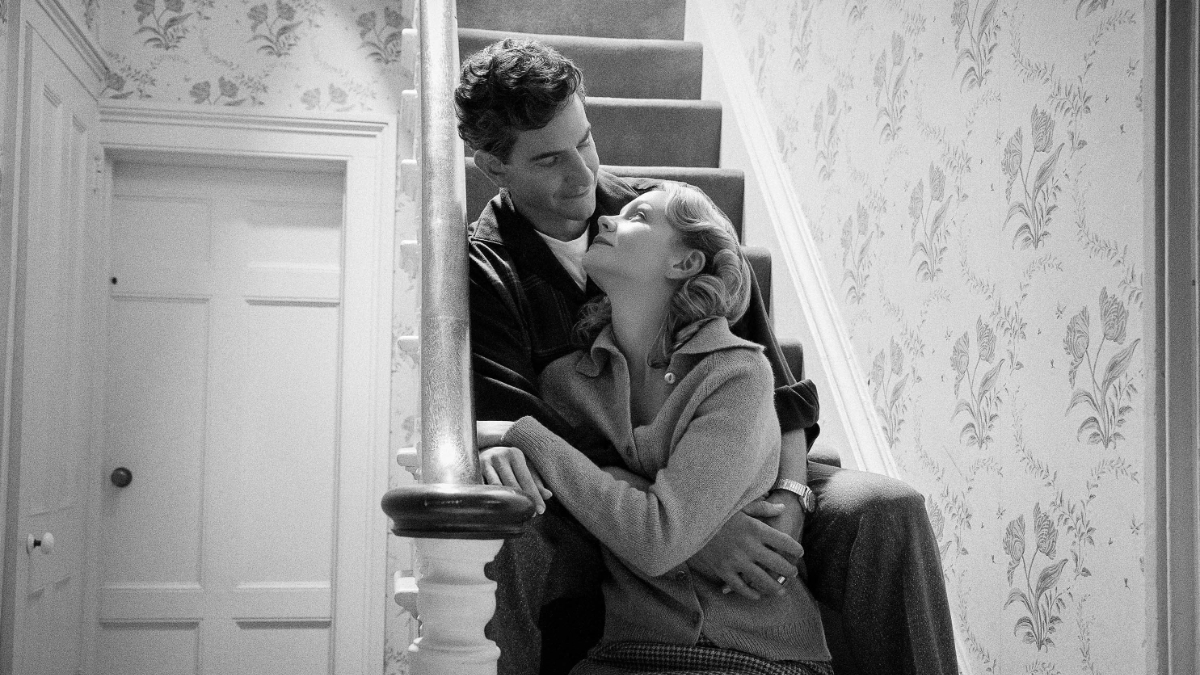
Some of these dualities are fleeting and inconsequential in themselves, marked by two on-camera interviews, two instances of him piano-playing orchestral music and reflecting on the difference, and two rounds of the number-guessing game, all hinting at a deeper theme of duality woven throughout the narrative.
But of course, the whole movie is also about pairs: Bernstein and Felicia, public Bernstein and private Bernstein, young Bernstein and old Bernstein. As with the cut from the conducting class to the club, Cooper is much more interested in simply stating that these different things co-exist than in trying to impose a scheme of coherence
Cooper’s film is at times unusual in its pacing and texture. Transitions within scenes, particularly changes in location and time, are not always clear. The film embraces occasional fantasy elements, such as a scene from Bernstein’s ballet Fancy Free seamlessly morphing into one from his musical On the Town, both staged in a vast, empty theatre solely for Bernstein and Felicia, ultimately involving them as performers too.
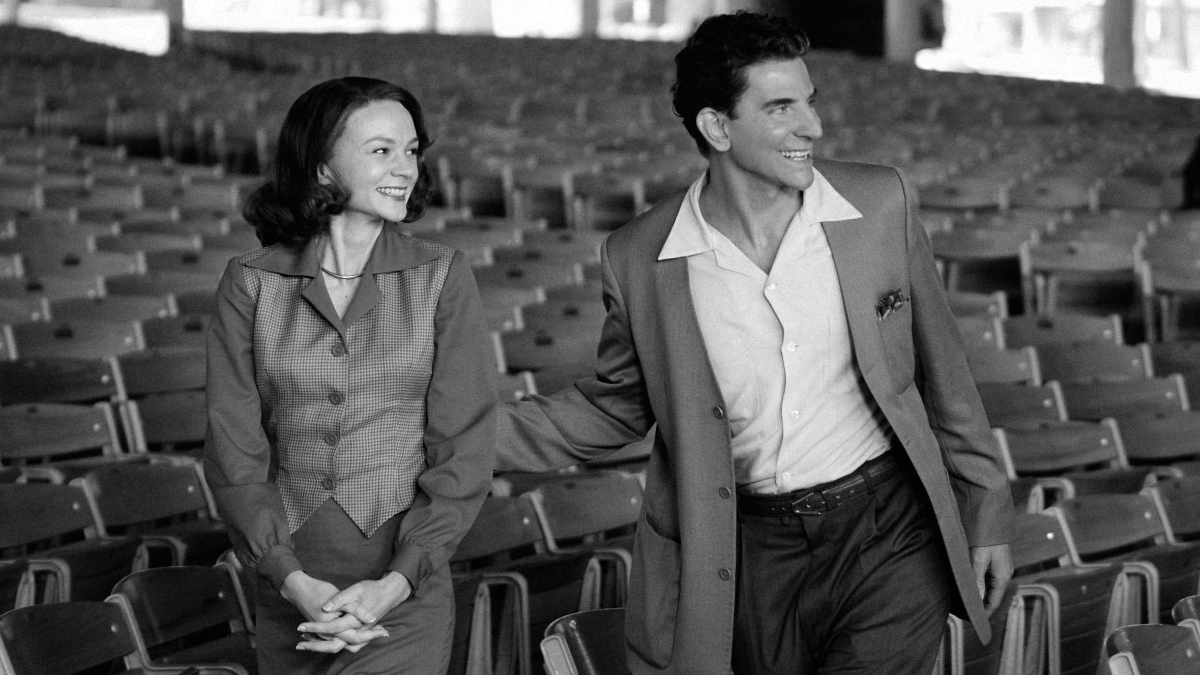
There are minor departures from the historical record, as well. For example, Bernstein met Tommy in San Francisco, not at the composer’s own house, and Felicia did not publicly reconcile with her husband in front of the Ely audience. They are, however, all rather unimportant in a film that is more impressionistic than plot-driven.
The film is far more enamoured of its subject than Tár (where he also briefly appears). However, it’s no hagiography. Bernstein doesn’t come across as flawless, and the film avoids grand pronouncements or explanations. While we may not fully grasp his relationship with Felicia by the end, the concluding image leaves no doubt of its profound reality.
Maestro may not answer many questions, but it also seems to be saying that the music and the love (the two Leonard Bernsteins, public and private) are all we need to understand. Alongside them, the rest is mere trivia.
USA | 2023 | 129 MINUTES | 1.33:1 • 1.85:1 | BLACK & WHITE • COLOUR | ENGLISH

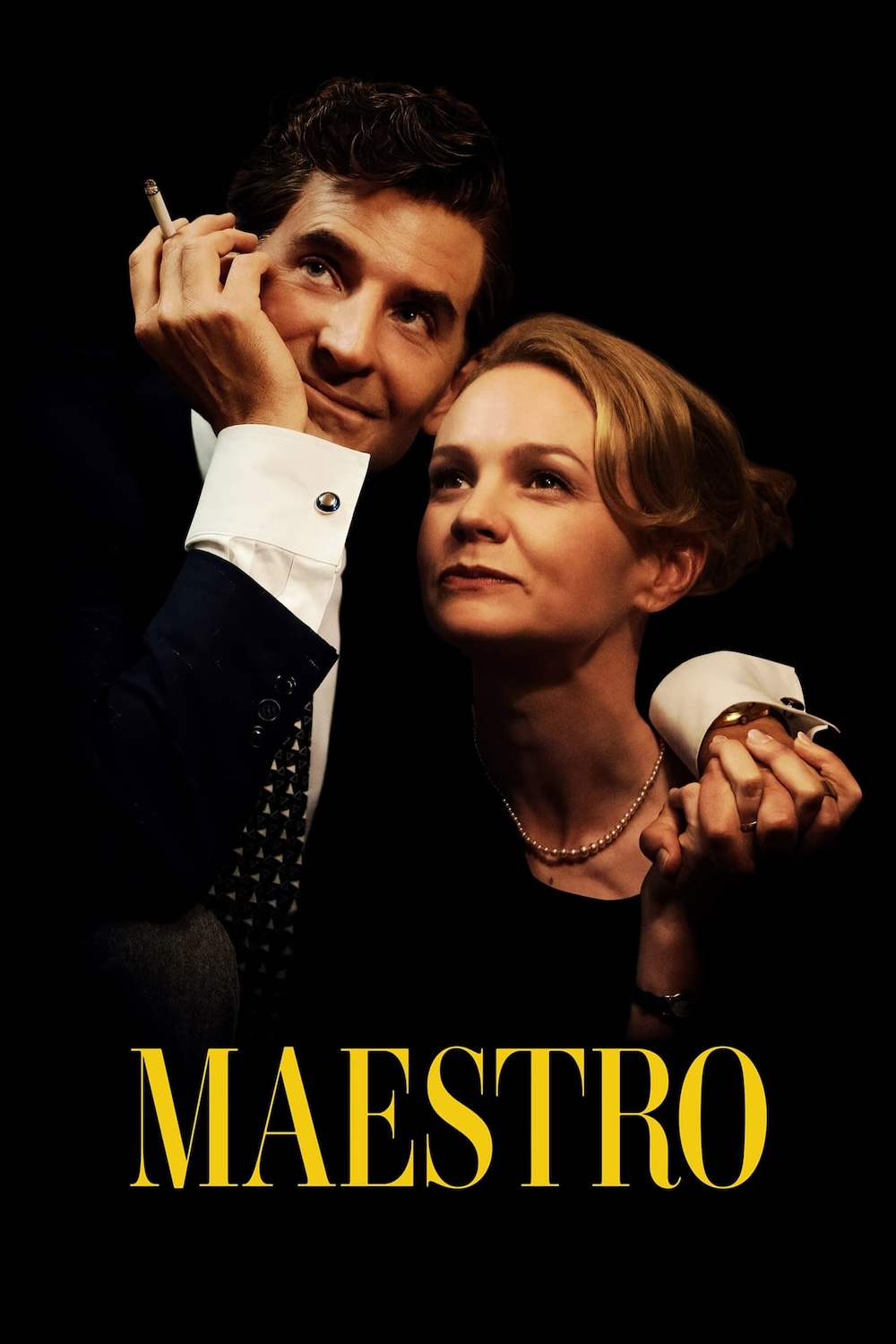
director: Bradley Cooper.
writers: Bradley Cooper & Josh Singer.
starring: Carey Mulligan, Bradley Cooper, Matt Bomer, Vincenzo Amato & Greg Hildreth.
